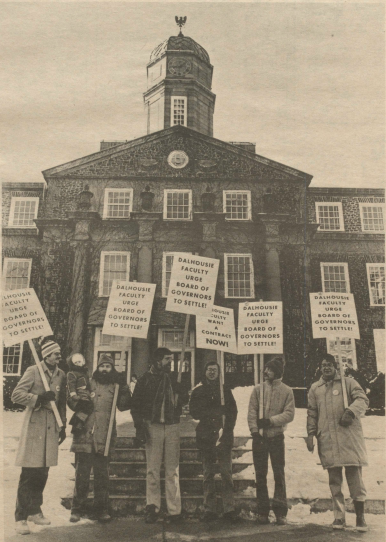The recent breakdown in negotiations between the Dalhousie Faculty Association (DFA) and the administration may remind members why they unionized in the first place.
A recent report from the DFA says the present situation is similar to the one prior to April 1978 when members voted to unionize.
In 1977 negotiating problems with the administration created concern among faculty over their weak position at the bargaining table. Each faculty member negotiated a separate contract and their salaries were among the lowest in the country. In a survey of salaries of 40 university faculties, assistant professors at Dalhousie ranked 37th; associate professors and professors ranked better, but remained in the lower 40 per cent.
At the time, the loosely structured DFA did not want to unionize. The were aiming for a system in which an organized faculty would be involved in collective bargaining with the administration, along with a binding arbitration clause.
A year later the DFA brought this proposal to the administration as part of their contract negotiations. The administration rejected it.
Seeing no other way of strengthening their weak bargaining position, the DFA decided to vote to form a union in Feb. of 1978.
One DFA representative, Michael Cross, said, “Its not appropriate to have people treated with such contempt, nor to have to deal constantly with arbitrary government. The process of negotiations to date clearly demonstrates the administration doesn’t bargain in good faith.”
There was opposition to the forming of a faculty union, not only from the administration, but from within the faculty itself.
John Graham, a senior member of the economics department, had emerged as the main voice for the opposing faction. He said while the faculty was united around salary demands, fringe benefits, and the need for protection from injustices, they were far from unified on the best means for achieving those goals.
Graham said the faculty’s position should be strengthened by granting it binding arbitration over salary and fringe benefits, the same proposal which had been rejected by the administration, prompting the need for a union.
The vote to unionize passed, and in 1979 the DFA was first recognized as the official faculty trade union during negotiations between faculty and administration. Collective bargaining had begun and both sides were pleased with the progress being made.
Unionization was the only way the faculty saw it could protect its “professional rights”, and it has now come to a point where the DFA say those rights are being threatened. It has decided, after five years, to use its greatest power as a union in defence – the right to strike.


Recent Comments